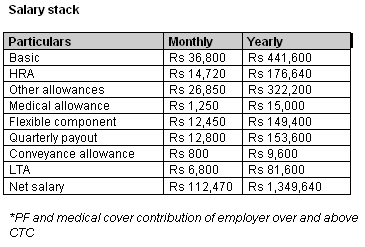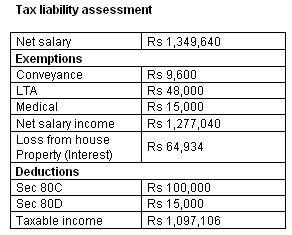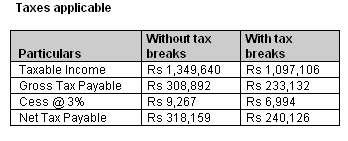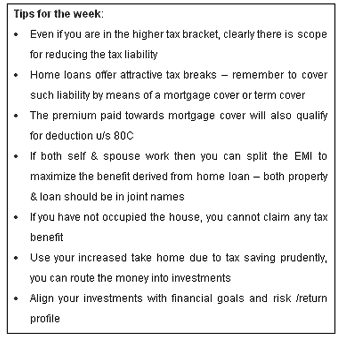
In the second part of this series on how salaried employees can optimise their tax outgo Anil Rego of Right Horizons explains how salaried employees earning between Rs 10 lakh and 25 lakh per annum can save Rs 78,000 in taxes if they plan smart.
For an employee with income more than Rs 10 lakh but less than Rs 25 lakh, there is a whole lot of avenues that can help reduce the taxes they pay.
Anand Roy, 35, working as a project director had finally decided to take a quick rendezvous on how best to optimise on taxes for the current year. The salary stack is as mentioned in the adjacent table.
Additional inputs provided by client:
Anand has a housing loan for which Rs 1,08,223 as interest and Rs 28,268 will be paid towards principal during the financial year. This was self-occupied, jointly-held with spouse who was also working and he wished to claim it in 60:40 ratio
He had another house which was under construction; had paid Rs 26,728 as pre-EMI towards the same.
Investments included:

Exemptions help you save taxes to a large extent. Based on Anand's stack and inputs thereof, we identified that he could claim the following exemptions:
Conveyance allowance: One could claim Rs 800 per month; this would not require any proofs
Medical allowance: One could claim Rs 15,000 per annum; here one has to produce medical bills of self or dependant
Leave travel allowance: Anand vacationed during the year with his family and had Rs 48,000 worth of travel bills; only travel bills are allowed herein; not lodging and food
Claiming home loan
On the "self-occupied house": The interest part can be claimed u/s 24 to a maximum extent of Rs 1.5 lakh per annum since he intended to claim 60 per cent (and spouse the balance), he would claim Rs 64,934 under this head and principal could be claimed u/s 80C which has an overall restriction of Rs 1 lakh alongside other investments. The principal component that he would claim would be Rs 16,961.
On the let out property: Since, this property is not occupied as yet, he will be unable to claim the tax breaks on this, he would however, claim the pre-EMI paid prior to occupation of house in 5 equal installments from the year in which he occupies the house.

This is applicable across all income slabs (as discussed in the first part this series). The fact remains that investments may be tax saving, but they have to be categorically aligned with your financial goals and you need to adequately take care of hedging your risk -- medical / life.
For example, Anand, had availed a child plan for his two-year old daughter to ensure that her higher education is taken care of. Also, he has adequately hedged his medical requirements (himself & family by availing a floater plan). However, he has missed evaluating the human life value and may be slightly under covered. Any individual who has a home loan should ensure that such o/s liability is adequately covered by means of a mortgage cover or a pure term cover.
Now, we prepare to embark on the task of assessing taxes at this stage and ascertaining the amount that one need to invest to gain the benefit u/s 80C and 80D (in the image alongside).

This clearly translates to a net benefit of Rs 78k, merely by claiming tax breaks appropriately. Tax optimisation can help achieve higher wealth, especially in the long term. It is also pertinent to ensure that you are invested in the right avenues -- ones which provide tax-free returns.
For even someone in the higher tax bracket there is significant gain, in Anand's case, the take home increases by Rs 6,500, he could choose to route it prudently towards investments to meet his child's need / retirement. He may also route this towards his EMI and lower his burden thereof.